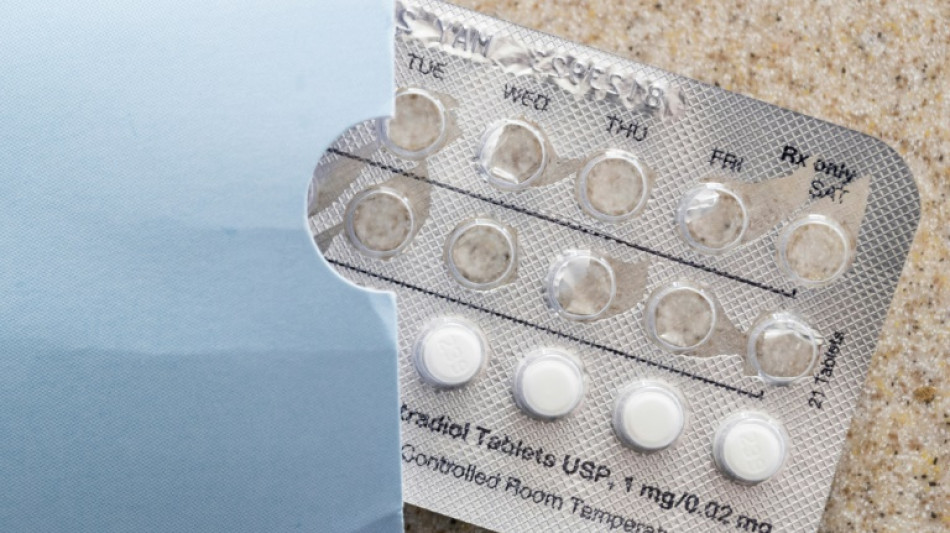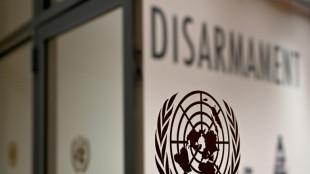
-
 Thailand says Cambodia agrees to border talks after ASEAN meet
Thailand says Cambodia agrees to border talks after ASEAN meet
-
Alleged Bondi shooters conducted 'tactical' training in countryside, Australian police say

-
 Swiss court to hear landmark climate case against cement giant
Swiss court to hear landmark climate case against cement giant
-
Knicks' Brunson scores 47, Bulls edge Hawks epic

-
 Global nuclear arms control under pressure in 2026
Global nuclear arms control under pressure in 2026
-
Asian markets rally with Wall St as rate hopes rise, AI fears ease

-
 Jailed Malaysian ex-PM Najib loses bid for house arrest
Jailed Malaysian ex-PM Najib loses bid for house arrest
-
Banned film exposes Hong Kong's censorship trend, director says

-
 Duffy, Patel force West Indies collapse as NZ close in on Test series win
Duffy, Patel force West Indies collapse as NZ close in on Test series win
-
Australian state pushes tough gun laws, 'terror symbols' ban after shooting

-
 A night out on the town during Nigeria's 'Detty December'
A night out on the town during Nigeria's 'Detty December'
-
US in 'pursuit' of third oil tanker in Caribbean: official

-
 CO2 soon to be buried under North Sea oil platform
CO2 soon to be buried under North Sea oil platform
-
Steelers edge Lions as Bears, 49ers reach playoffs

-
 India's Bollywood counts costs as star fees squeeze profits
India's Bollywood counts costs as star fees squeeze profits
-
McCullum admits errors in Ashes preparations as England look to salvage pride

-
 Pets, pedis and peppermints: When the diva is a donkey
Pets, pedis and peppermints: When the diva is a donkey
-
'A den of bandits': Rwanda closes thousands of evangelical churches

-
 Southeast Asia bloc meets to press Thailand, Cambodia on truce
Southeast Asia bloc meets to press Thailand, Cambodia on truce
-
As US battles China on AI, some companies choose Chinese

-
 AI resurrections of dead celebrities amuse and rankle
AI resurrections of dead celebrities amuse and rankle
-
Heirs Energies Agrees $750m Afreximbank Financing to Drive Long-Term Growth

-
 Black Book Poll: "Governed AI" Emerges as the Deciding Factor in 2026 NHS Procurement
Black Book Poll: "Governed AI" Emerges as the Deciding Factor in 2026 NHS Procurement
-
Hemogenyx Pharmaceuticals PLC Announces Update on Admission of Shares

-
 Pantheon Resources PLC Announces Shareholder Letter and Corporate Update on Dubhe-1
Pantheon Resources PLC Announces Shareholder Letter and Corporate Update on Dubhe-1
-
Tocvan Begins Trenching Material for the Pilot Mine and Pushes Ahead With Infrastructure Development

-
 Steelers receiver Metcalf strikes Lions fan
Steelers receiver Metcalf strikes Lions fan
-
Morocco coach 'taking no risks' with Hakimi fitness

-
 Gang members given hundreds-years-long sentences in El Salvador
Gang members given hundreds-years-long sentences in El Salvador
-
Chargers, Bills edge closer to playoff berths

-
 Gang members given hundred-years-long sentences in El Salvador
Gang members given hundred-years-long sentences in El Salvador
-
Hosts Morocco off to winning start at Africa Cup of Nations

-
 No jacket required for Emery as Villa dream of title glory
No jacket required for Emery as Villa dream of title glory
-
Amorim fears United captain Fernandes will be out 'a while'

-
 Nigerian government frees 130 kidnapped Catholic schoolchildren
Nigerian government frees 130 kidnapped Catholic schoolchildren
-
Captain Kane helps undermanned Bayern go nine clear in Bundesliga

-
 Captain Kane helps undermanned Bayern go nine clear
Captain Kane helps undermanned Bayern go nine clear
-
Rogers stars as Villa beat Man Utd to boost title bid

-
 Barca strengthen Liga lead at Villarreal, Atletico go third
Barca strengthen Liga lead at Villarreal, Atletico go third
-
Third 'Avatar' film soars to top in N. American box office debut

-
 Third day of Ukraine settlement talks to begin in Miami
Third day of Ukraine settlement talks to begin in Miami
-
Barcelona's Raphinha, Yamal strike in Villarreal win

-
 Macron, on UAE visit, announces new French aircraft carrier
Macron, on UAE visit, announces new French aircraft carrier
-
Barca's Raphinha, Yamal strike in Villarreal win

-
 Gunmen kill 9, wound 10 in South Africa bar attack
Gunmen kill 9, wound 10 in South Africa bar attack
-
Allegations of new cover-up over Epstein files

-
 Atletico go third with comfortable win at Girona
Atletico go third with comfortable win at Girona
-
Schwarz breaks World Cup duck with Alta Badia giant slalom victory

-
 Salah unaffected by Liverpool turmoil ahead of AFCON opener - Egypt coach
Salah unaffected by Liverpool turmoil ahead of AFCON opener - Egypt coach
-
Goggia eases her pain with World Cup super-G win as Vonn takes third


All hormonal contraceptives increase breast cancer risk: study
All hormonal contraceptives carry a slightly increased risk of breast cancer, including the increasingly popular progestogen-only pills, according to a study published on Tuesday.
The researchers who carried out the study stressed that the increased risk of breast cancer needs to be weighed against the benefits of hormonal contraceptives, including the protection they provide against other forms of female cancer.
Previous studies have established an increased risk of breast cancer from two-hormone, or combined, contraceptives that use both estrogen and progestogen.
While the use of progestogen-only contraceptives has been on the rise for well over a decade, little research had been performed previously on their links to breast cancer.
The study, published in the journal PLOS Medicine, found that the risk of a woman developing breast cancer was about the same for hormonal contraceptives using both estrogen and progestogen as for those using just progestogen.
According to the study, women taking hormonal contraceptives have a 20 to 30 percent higher risk of developing breast cancer than those who do not use them.
The findings are similar to those published previously, including in a vast 1996 study.
The risk remains about the same regardless of the delivery method -- oral pill, IUD, implant or injection -- or whether it is a combined pill or progestogen alone.
Taking into account that the likelihood of breast cancer increases with age, the authors of the study calculated how much absolute excess risk is associated with hormonal contraceptives.
For women taking hormonal contraceptives for a period of five years between the ages of 16 to 20, it represented eight cases of breast cancer per 100,000, they said.
Between 35 and 39 years old, it was 265 cases per 100,000.
- 'Very small increase in absolute risk' -
"Nobody wants to hear that something that they're taking is going to increase their risk of breast cancer by 25 percent," said Gillian Reeves, a professor of statistical epidemiology at the University of Oxford and a co-author of the study.
"What we're talking about here is very small increase in absolute risk," Reeves said.
"These increases in risk for breast cancer have to, of course, be viewed in the context of what we know about the many benefits of taking hormonal contraceptives," she added.
"Not just in terms of birth control, but also because we know that oral contraceptives actually provide quite substantial and long term protection from other female cancers, such as ovarian cancer and endometrial cancer."
The study also confirmed, like others, that the risk of breast cancer declines in the years after a woman stops using hormonal contraceptives.
Stephen Duffy, a professor at Queen Mary University of London who did not take part in the study, described the findings as "reassuring in that the effect is modest."
The study involved data from nearly 10,000 women under the age of 50 who developed breast cancer between 1996 and 2017 in the United Kingdom, where the use of progestogen-only contraceptives is now as widespread as the combined method.
Reeves said there were several explanations for the growing use of progestogen-only contraceptives.
They are recommended for women who are breast-feeding, who may be at risk of cardiovascular problems or smokers above the age of 35.
"It might just be because women are taking hormonal contraceptives possibly into later years now," Reeves said.
"So they are naturally at higher risk of those other conditions for which risk is increased with combined contraceptives."
P.Santos--AMWN



